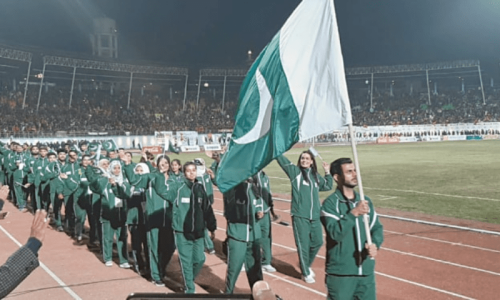KARACHI: Ghazal is written and understood in Punjab, whereas in Karachi nazm is written and appreciated. In Punjab, if you read out a nazm, people react to it in a strange manner. Poetry lovers in Karachi, on the other hand, understand every line that’s penned in the nazm form. This was stated by Sweden-based poet Masood Qamar at the launch of a book of poems titled Kaghaz pe bani dhoop that he co-authored with Husain Abid, at the Arts Council on Thursday evening.
Shedding light on the unique attempt of jointly writing poems, Mr Qamar narrated an anecdote where responding to Fahmida Riaz’s query at a mushaira about a humorous Punjabi verse Ahmed Faraz had remarked that it could only be experienced, not translated. The poet said in a similar vein he could not explain the experiment of writing Urdu poems with Husain Abid. It all started when he met his old friend Abid (who lives in Germany) on Facebook and decided to give the experiment a shot, he told the host of the launch, Momin Khan Momin, adding that the attempt could only be made if at least 80 per cent of ideas and ideologies of those who were co-writing it matched. He admitted that the two poets were so much immersed in the entire exercise that today they could not tell which line was composed by which poet.
Dr Pirzada Qasim was the chief guest on the occasion. Lauding the two poets’ effort, he said in literature it was difficult to move off the beaten track, because literature was steeped in tradition, which was the reason that creative people often hesitated to experiment in poetry. There were examples, however, like that of Zafar Iqbal who in the genre of ghazal tried to move away from established norms, and kept doing that with consistency. If he (Iqbal) had got flustered in the early phase of his career and discontinued what he had set out to do, he would not have succeeded. Similarly, he said, poets in the past used to be reluctant to write the prose poem, but not anymore.
Dr Qasim stressed that people should not create impediments in the way of poetic endeavours. He was of the view that Masood Qamar and Husain Abid’s book could be understood in the context of world literature. Commenting on the joint experience of writing poems, he said the first line had to come from a single individual and from then on the like-minded other(s) could follow the train of thought. He claimed that the book was brimming with poetic sensibilities and quoted quite a few examples from it. One of them was:
Kitab, jise main ne buhat kucch baich ke khareeda
Kitab, jis ne mujhe bikne se bachaya
[I sold a lot to buy books and
Books helped me not to become a
saleable commodity]
Prof Sahar Ansari, who presided over the event, said the prose poem was now an established and accepted genre of Urdu poetry. He was of the opinion that contrary to what people thought about linguistic structures, it was not a recent phenomenon, because in our part of the world writers had been doing that for ages. He gave the example of Quli Qutb Shah who translated Hafiz’s phrase ‘hangam-i-toba shikan’ as ‘hangam-i-toba todan’. In recent years, he said, there were the likes of Ashfaq Ahmed, Zafar Iqbal and Iftikhar Jalib who did that. Even Ghalib used phrases which were uncommon in his day and age, he said.
Prof Ansari said Mr Qamar had been living in the West for many years, but despite that he’s connected to his roots and his poetry carried references like ‘rangeen chooriyan’ and ‘lacha’ with all their aesthetic beauty. On the issue of co-authoring a poem, he argued that it too was not something novel, for such examples could be found in folk poetry. He lauded the subject matter of the poems which focused on problems ranging from religious bigotry to class disparities. Apart from his achievements in literature, he said, Mr Qamar was a respected journalist who faced hardships during Gen Ziaul Haq’s rule. Ahfazur Rehman in his latest book had written extensively about Mr Qamar’s sacrifices, he added.
Tanvir Anjum, Nasr Malik, Naseem Anjum and Mithan Soomro also spoke.
Published in Dawn, November 27th, 2015













































Dear visitor, the comments section is undergoing an overhaul and will return soon.